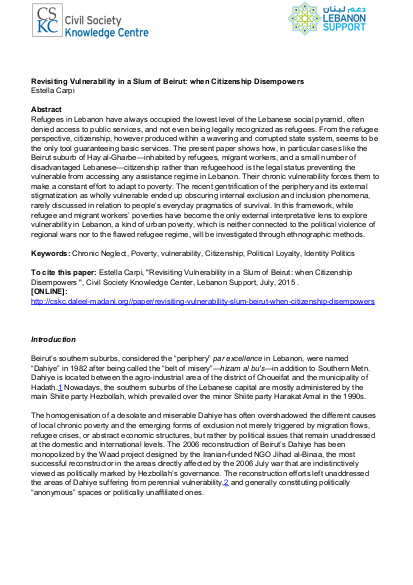
Refugees in Lebanon have always occupied the lowest level of the Lebanese social pyramid, often denied access to public services, and not even being legally recognized as refugees. From the refugee perspective, citizenship, however produced within a wavering and corrupted state system, seems to be the only tool guaranteeing basic services. The present paper shows how, in particular cases like the Beirut suburb of Hay al-Gharbe—inhabited by refugees, migrant workers, and a small number of disadvantaged Lebanese—citizenship rather than refugeehood is the legal status preventing the vulnerable from accessing any assistance regime in Lebanon. Their chronic vulnerability forces them to make a constant effort to adapt to poverty. The recent gentrification of the periphery and its external stigmatization as wholly vulnerable ended up obscuring internal exclusion and inclusion phenomena, rarely discussed in relation to people’s everyday pragmatics of survival. In this framework, while refugee and migrant workers’ poverties have become the only external interpretative lens to explore vulnerability in Lebanon, a kind of urban poverty, which is neither connected to the political violence of regional wars nor to the flawed refugee regime, will be investigated through ethnographic methods.
Resource collections
- UN Habitat - Urban Response Collection
- Urban Response - Urban Crisis Preparedness and Risk Reduction
- Urban Response Collection - Community Engagement and Social Cohesion
- Urban Response Collection - Economic Recovery
- Urban Response Collection - Environment and Climate Change
- Urban Response Collection - Housing, Land and Property
- Urban Response Collection - Urban Crisis Response, Recovery and Reconstruction
- Urban Response Collection - Urban Resilience